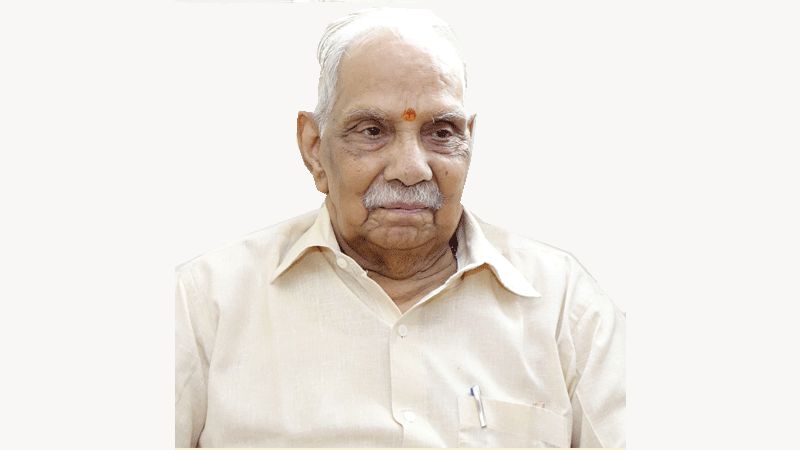Integral humanism is not a quick-fix solution for electoral success nor is it a convenient strategy for capturing power. It is not even a political philosophy devised to promote and support any political party. It is a comprehensive world-view which originated in India as a result of the profound insight of generations of wise men who are known as the ‘Rishis’. It covers every spectrum of human life and its foundations are eternally sound and always relevant. It is from that rich philosophy that the great Indian culture evolved. Any truly nationalist movement can benefit from this all embracing philosophy. It is inclusive of spiritual as well as material progress of mankind.
P. Parameswaran
Continue from 16-30 Sept., 2019 Issue…
VII
India had a perspective vision of the evolution of human society through various stages, from the Man. the Individual, to Humanity the Universal. In between there are a number of stages one evolving into a larger one in successive wider and wider circles. They do not cancel each other. The smaller unit evolves into the next one each accepting the other. Indian concept was of “Akhanda Mandalakara” in the shape of unbroken evolutionary circle. Each is necessary for the other and fulfils the other. So the individual man evolves into the family, it grows into the society, expands into the nation and then to humanity which comprises of all the nations, embracing each other in a warm and co-ordial relationship. Nationalism is an important and vital link in this ladder of human evolution. It cannot be set aside or eliminated as long as human society has not evolved into a level of consciousness which makes nations redundant. But things are as they today, it is too farfetched and unrealistic to think that we are anywhere near that stage. What can be the best solution for today`s conflict of nations and civilizations is to organize forum where peaceful co-existence of each is assured in the best manner possible. In this, India with its strong tradition of Universal acceptance can play its role. It is precisely this that the concept of Integral humanism envisages.
“Don’t preach big ideas. Give us something practicable, something that will bring immediate results. We are a political party. Tell us how we can come to power at the earliest.” This seems to be the demand of everyone who enters political arena, especially from the younger generations. They look upon politics as a career, a shortcut of success. Which also means a shortcut to amass wealth regardless of means? Those who are more talented choose placement in global corporate bodies. Those who are not up to the mark choose politics. This approach to politics wipes away at one stroke all claims of being “party with a difference”. Pre- independent politics was service, patriotism and above all mission. Unless we restore that attitude and image, things will go from bad to worse.
Ideology is philosophy. Philosophy according to some people is impractical. Politics is the art of the possible. So how do you reconcile politics with philosophy and ideology? This is a question that confronts the younger generation of the political workers, even those who enter politics with the best of intentions. Therein lies the challenge, Bhagavad Gita says “Yogah karmasu kousalam”. Yoga is skill in action. It lies in combining idealism with pragmatism. Our great political leaders were also highly venerated philosophers. At least in India, there should be no dichotomy.
Conclusion
How do we successfully solve the problems which our country faces? Problems are in fact not only national but global. They are critical. The challenge has to be met. If we fail, the cost we have to pay will be too high. What are the problems? Climatic change, ecological destructions, the divide between the rich and the poor, huge unemployment, terrorism and what not? How can Integral Humanism help us in solving these problems? We have to begin by ridding our own house of these complex problems to start with. Most of our assumptions have gone wrong. It was thought that industrialization will bring about fundamental changes by providing more employment, enrichment and empowerment of the poor and peaceful and harmonious society. Our post independent leaders thought that agriculture based economy breeds poverty and backwardness. They wanted to shift agriculture workers from villages to towns and industrial cities. The country had to be industrialized, means urbanized. After 60 years, we find rural areas stand neglected and backward. While industrialization has not been able to provide employment anywhere near our expectation, sophisticated technology has reduced the demand for employment.
Organised sector has failed to provide employment to the skilled labour. Unskilled labour which form the largest chunk of our population are unorganized, incapable of bargaining and are living at the mercy of middlemen who exploit them. Condition of those who were traditionally living in forests , owning , enjoying and also sustaining the forest wealth are now at the mercy of outside capitalist who have no sympathy for the forest dwellers. Maoism and naxalism are thriving in the forest. Deforestation at a rapid rate is destroying the mandatory forest cover and playing havoc with our natural resources. Sacred rivers and water resources are getting depleted and polluted. The deprived lot in large numbers migrates to megacities and creates unmanageable problems including anti-social activities. This overall view shows that the policies often followed have proved not only unsuccessful but positively unhealthy. It is high time that we change the track.
To be continued…
(Page no- 241-42, The Human Cycle The Ideal of Human Unity War and Self –Determination, Shri. Aurobindo.)


